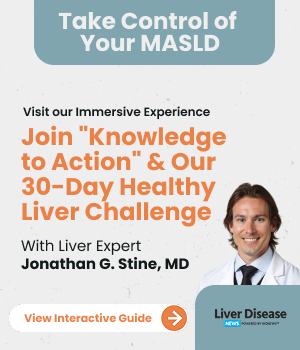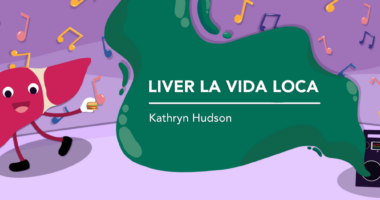Madrigal CEO: Rezdiffra OK for NASH a ‘watershed moment’
Medicine is first to promote NASH resolution, reduce liver scarring

The approval of Rezdiffra (resmetirom) last month in the U.S. as the first ever treatment for nonalcoholic steatohepatitis (NASH), a severe type of fatty liver disease, was hailed as “a watershed moment” by Madrigal Pharmaceuticals’ CEO Bill Sibold.
“There’s such a high unmet need and it’s such a serious disease … and to think that there’s been no approved therapy … it’s really unbelievable,” Sibold said in an interview with Liver Disease News.
The once-daily oral therapy, which is meant to be used along with diet and exercise, is the first to promote both NASH resolution and liver scarring (fibrosis) reduction in this patient population in a Phase 3 clinical trial. It became available last week to eligible patients in the U.S. through a specialty pharmacy network.
“To have a chance now to partner with the community on a product like Rezdiffra … and to make a difference in so many people’s lives … this is why you’re in the industry,” said Sibold, who emphasized the company doesn’t see Rezdiffra as just its own product; the entire NASH community played an important role in its development. “This is really the community’s product in many ways … we’re the stewards of it,” Sibold said.
Rezdiffra is under review in the European Union, where there are no approved treatments for NASH.
Equal access to Rezdiffra a priority
As the rollout of Rezdiffra continues in the U.S., Sibold said “equitable access” is a top priority.
The company is working toward a maximum $10 monthly co-pay for the medication for patients with commercial insurance. Madrigal also has a patient assistance program to help patients navigate access-related issues and provide it to uninsured or underinsured patients at no cost.
“People have waited a long time,” Sibold said, adding “what we want to make sure is that … no group is disadvantaged or overly advantaged, that we make the product available, regardless of your status.”
NASH was recently reclassified as metabolic dysfunction-associated steatohepatitis, or MASH. In the disease, fatty deposits build up in the liver, causing inflammation and fibrosis. Left unaddressed, it leads to cirrhosis, or irreversible liver scarring and damage, that can cause the liver to fail. The disease is the leading cause of liver transplants for women in the U.S. and is likely to soon become true for men, Sibold said.
It’s critical to treat the disease before liver failure happens, but no medication could effectively slow or even reverse fibrosis until Rezdiffra’s approval. Lifestyle changes like diet modifications and exercise were the only way to manage the disease.
NASH’s ‘tough prescription’
NASH patients are “one to two steps away from developing cirrhosis and they “have had literally nothing,” Sibold said. “In most diseases, there’s products that people will use off-label, and have something.” “But here, you’ve been told, go home and lose weight, exercise, start the Mediterranean diet… and boy that’s a tough prescription … everyone’s tried that, but that’s a hard thing to do.”
Sibold said nearly every physician he talks to can tell a story about how quickly a NASH patient can progress if they don’t have the right treatment. Patients with a “clean lifestyle” have “some fatty liver, and then the next time they show up, they’ve slipped to cirrhosis and they’re on a path to transplant,” he said.
Despite the serious need, the CEO said NASH has long been considered “one of those graveyards of drug development” and more than 20 other development programs before Rezdiffra have failed. “There’s always been a high technical hurdle,” Sibold said, adding a lot of Rezdiffra’s success “comes down to the mechanism, and other mechanisms perhaps haven’t been as liver-directed.”
Rezdiffra is designed to activate a protein called thyroid hormone receptor beta in the liver and whose impaired activity is associated with disease progression and fibrosis in NASH patients.
This mechanism “really goes to the source of the problem and really stays kind of very focused in the liver,” Sibold said.
Sibold also credits the medicine’s success to the “thoughtful” design of the development program, which is “the largest, most comprehensive NASH program that’s been created.”
Rezdiffra was approved for patients with moderate to severe fibrosis who haven’t yet advanced to cirrhosis, based mostly on findings from the Phase 3 MAESTRO-NASH trial (NCT03900429).
One year on the therapy was associated with higher rates of NASH resolution without worsening fibrosis, as well as reduced fibrosis without worsening NASH, relative to a placebo.
Sibold emphasized that it was important to achieve both outcomes. “You’re taking away the fat in the liver … [and] creating the environment within the liver for the fibrosis to heal,” Sibold said.
As NASH patients who haven’t progressed to cirrhosis might not feel symptoms of the liver disease in their daily lives, it might not be immediately apparent that Rezdiffra is helping. But what it offers is “peace of mind.” Patients who are living in fear of future serious outcomes like liver transplant, liver cancer, or cardiovascular disease that might arise if their fibrosis isn’t stopped or reversed can now have “hope that there’s a future that you don’t have the bad outcome that currently exists,” Sibold said.
It’s “the fear of that to come versus the hope of turning back the clock,” he said.
Rezdiffra was cleared under an accelerated approval pathway, meaning it can be marketed, but regulators will still need more evidence of its effectiveness before it can be fully approved. That approval may be supported by the ongoing MAESTRO-NASH study where patients are being followed for up to about 4.5 years on the therapy. Investigators will look at clinical outcomes such as cirrhosis, liver transplant, and death.
The trial is “looking at … what is the longer term impact of taking the product,” Sibold said.
Seeking Rezdiffra’s full approval
Data from another ongoing Phase 3 trial called MAESTRO-NASH-OUTCOMES (NCT05500222) could also back a full approval of Rezdiffra. The study is testing it against a placebo in NASH patients with well-compensated cirrhosis, where the liver can still maintain its important function and there aren’t usually symptoms.
The hope would be that Rezdiffra could halt or reverse liver scarring and prevent disease progression to more serious liver problems in those with more advanced NASH.
Sibold said the data will determine whether the study will support an eventual label expansion to include patients with compensated cirrhosis.
“We’re very data driven,” Sibold said. “We would want to expand if the data supports expanding. Until that time, we only want to stay in who’s going to benefit.” Sibold also said Madrigal doesn’t believe Rezdiffra is for NASH patients without mild liver fibrosis.
He said Madrigal is working closely with physicians to ensure they’re evaluating patients accurately so only those eligible are prescribed the medication, and that they “inform patients of any side effects that may occur.”
“It’s really important that people know exactly what they can expect from a product,” Sibold said.
The most commonly reported side effects in trials were related to gastrointestinal upset, such as diarrhea, nausea, vomiting, constipation, and abdominal pain. These often decrease with time. “Being a once-a-day pill that is generally well tolerated is a real benefit for the patients if they’re going to be on the product … for a longer period of time,” Sibold said.
Looking ahead, Sibold sees Rezdiffra’s historic approval as a seminal event that might ultimately change the landscape of NASH therapeutics in years to come and Madrigal hopes to remain a leader in the field in the long-term. The CEO points to the history of other diseases, noting that usually, “once one product becomes available and shows that there truly is an unmet need and … a solution, you have more interest in investing, in looking for the next … innovation in that space.”
“There’s going to be much more interest in NASH/MASH than there has been in a long time,” Sibold said. “We’ve already done a lot of innovation, but … I’m hopeful there’ll be more.”









